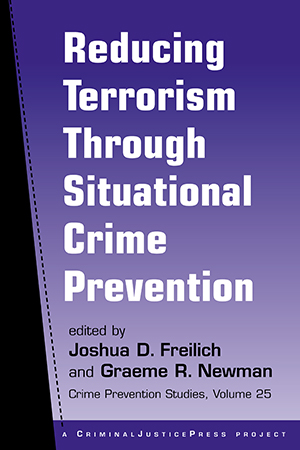
- 2009/244 pages
- Crime Prevention Studies, Volume 25
- A CriminalJusticePress Project
Reducing Terrorism Through Situational Crime Prevention
Hardcover: $59.95
ISBN: 978-1-881798-93-4
Paperback: $26.00
ISBN: 978-1-881798-94-1
The authors explore the application of situational crime prevention (SCP) techniques to the battle against terrorism. "It is little wonder," the editors assert in their introduction, "that SCP should emerge as a significant approach to solving the problem of terrorism. It is an approach that is so practical and so focused on protecting individuals, locations and groups from victimization. It has always been primarily concerned with making our world safe and secure."





